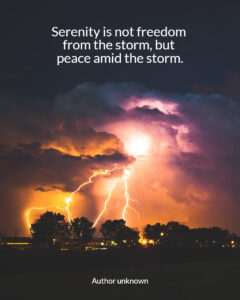By Luke Brason
Ever watched two people have a remarkably similar, if not identical, day? Watched as one person thrives and the other finds it incredibly stressful?
Ever had one day where you feel you can take on the world, yet only a few days later you’re feeling pressure from every side? You look and inspect what has changed, and you find no external circumstances have changed – the things on your mind were there earlier in the week, they just mattered less and did not dominate your thinking previously.
These questions I find fascinating – for me it’s proof that how we react and adapt to conditions defines our experience of reality. It is not the ‘stressors’ that we should work on, it’s our ability to manage and deal with stress that is key. This is good news – we can improve our ability to deal with stress! Don’t focus on removing the stressors (stress will always be around). Build up your resilience.

Photo by Max LaRochelle on Unsplash
Whilst we can grow resilience, I do think, for whatever reason, that people are born with various levels of innate resilience. I also think our early childhood is an important time to establish as many resilient ‘processes and techniques as possible (as a side note, something I wish the education system focused on). However, I don’t believe it matters where you start, the point is resilience is always something you can develop.
I’m going to tell you a little bit about myself to help put this into context. I was born to a hard-working and loving mother, someone who has always been a rock in my life. And to an alcoholic father who brought chaos and challenges (fortunately I made my peace with him before he died). From an early age my mum helped guide me, helped me to find answers and to think for myself. We didn’t call it developing resilience back then – no-one did! – but she carefully crafted in me the ability to reason, to feel and to take responsibility for my own actions and my own thoughts.
I learned a children’s meditation technique when I was 5, and an adult’s technique when I was 10. Although I practiced neither regularly until becoming an adult (when life gets more stressful!), it is my belief that the times I did practice as a child helped instil an experience and an awareness of peace. I’ve known from a very young age that whatever life is going to throw at me, there is a wellspring of tranquillity inside that can help ride out the bumpy waves. I’ll challenge anyone who thinks life is suffering – it’s not, life is about the expansion of happiness.
This doesn’t mean that I am always at peace – I can get into a funk and I have days where things can seem like they are too much, but, and this is the blessing, once I realise that I’m in a funk, I know there is a way out. And then I’ll enact and call upon the various wellbeing tools and techniques I’ve learned to help manage situations and my responses and feelings toward them.
Right now, I’m going through by far the most stressful time of my life – I am in the middle of a complicated and an emotional divorce. On some days this year (my birthday and Father’s Day in particular) I’ve been paralysed by tears. I’ve been very open with colleagues and friends about this, and they have been incredibly supportive. This is an area where I’ve only recently developed more resilience. This year I’ve learned it’s ok to not be ok, and that it’s good to talk about things that are bothering you. By talking openly with caring listeners, the stress overload on these days lifted – it stopped the stress ‘sticking’. This is not something I used to do previously – I had before made the error of thinking ‘it’s my mess, I got myself into this, I’ll get myself out’… you don’t need to solve everything on your own. In fact, very often, you don’t need to ‘solve’ something – it can just be a case of ‘accepting’.
Resilience also heads things off at the pass. The difficult days I mentioned, I am convinced that had I not invested in developing resilience in previous years, I would truly have ‘blown-up’ this year and on many occasions. Instead, despite the year of the ‘biggest’ challenges and the biggest of changes, I have never felt better, more at ease with myself, more comfortable with who I am. Many people have told me I’m looking well – and I am, I’ve lost weight (through exercise and better nutrition), I’m smiling a lot, I’m enjoying my job more than ever, I’m loving interacting with friends and family in a deeper and more connected way. When you are caring for yourself, the remarkable thing is, you are then better able to care for others around you. Resilience begets resilience.
For me, I am absolutely convinced that resilience is the greatest and most important skill to develop. This leads me to what I view as the critical first step to developing resilience. You must desire. You need to accept that you are responsible for your thoughts and your wellbeing. Others help and support – and they will when you let them – but you must desire and to take ownership. Your thoughts are your thoughts. Your perception of reality is yours alone, you are unique and uniquely awesome.
These are some of the ways that I’ve found effective for developing resilience. This list is of course not exhaustive and what is right for one person may not be for another. I’d also really love to hear your thoughts on how you’ve increased your own resilience. What are your top recommendations?
Ways to develop resilience
- To thine own self be true
There is no-one else like you on the planet. You’re amazing – we all are. We all have different talents, skills and desires. Follow yours. Never try to impersonate. Be yourself, trust yourself – you are enough. - Exercise
Exercise is good for the body, but studies also repeatedly show it’s good for the mind and for improving mental health. Find something you enjoy doing. Don’t overdo, avoid strain. - Sleep well
Rest is vital for humans. Studies into the circadian rhythm show that a good sleep pattern can support mental wellbeing as well as providing the deep physical rest we all need. - Good nutrition
We are what we eat. People fuel is essential for keeping us healthy and energised, studies again confirming that a health body helps support a healthy mind. - Meditate regularly
I meditate twice daily. Not for the sake of the meditation, but for the effect on action. Taking the time to allow your mind to quiet, to experience the stillness of being, creates a bedrock of self-awareness and self-sufficiency. (I practice transcendental meditation, but there are plenty of other techniques, find one you enjoy, but aim to choose one backed up by research). - Make time for yourself, be kind to yourself
Don’t just be ‘nice’ to yourself. Treat yourself with compassion and love – do the things that bring you bliss, enjoyment and happiness. This is your life – follow your dreams. Dream big. Aim to leave no desire unfulfilled. - Be kind to others
Studies show that giving can improve our own mental health. Give freely, don’t expect anything in return. Sometimes the ‘gift’ can be as simple as a smile and a compliment. - Be present
This, for me, relates to meditation (as meditation helps set up presence). Experience ‘being’ and enjoy the ‘now’. Past and future are in your head, we only live in this moment, experience it as fully as you can. - Learning and development
Never stop learning. Being human is a state of constant evolution. Have goals and ambitions – develop the skills you need to fulfil them. Set goals to establish your motivation. Life is about growth. - Trust your instinct
In terms of wellbeing, we intrinsically know what to do. We might stop ourselves, or talk ourselves out of an idea, or trick ourselves into doing something different – but deep down, we already know how to show love to ourselves. Trust your intuition. The only thing that can stop you from continually developing and improving your resilience is you.
Luke Brason has worked agency-side for c. 25 years and is currently a Group Account Director at LAW Creative. He is passionate about Health and Wellbeing and helping people to unlock their full potential – reach out to Luke on LinkedIn if you’d like to connect and chat on this topic.


